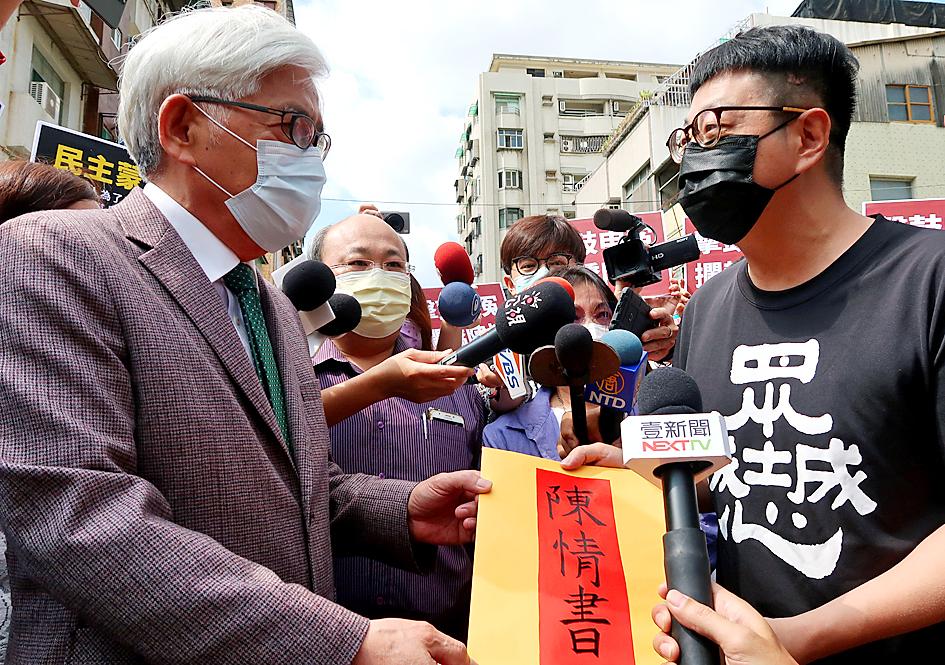The Central Election Commission (CEC) yesterday reached an agreement with the Kaohsiung City Election Commission to set up the same 1,823 polling stations used in 2018’s Kaohsiung mayoral election for the June 6 vote to recall Kaohsiung Mayor Han Kuo-yu (韓國瑜).
The arrangement was reached as some venue hosts retracted their agreements to provide space for polling stations.
As of Thursday, the Kaohsiung commission had only obtained permission to use 64.8 percent of the venues that it expects would be needed for the recall vote.

Photo: CNA
It has also drawn criticism for announcing that elementary and junior-high schools would only be allowed to provide two classrooms as polling stations, saying that it would help prevent the spread of COVID-19.
Kaohsiung Deputy Mayor Chen Hsiung-wen (陳雄文), the Kaohsiung commission’s head, yesterday said that it had encountered “considerable difficulty” in trying to secure space for polling stations, as only about half of the 900 schools have agreed to provide classrooms.
CEC Chairman Lee Chin-yung (李進勇) yesterday visited Kaohsiung to help resolve the issue.
“Wherever people voted in the 2018 [Kaohsiung] mayoral election is where they will vote in the recall vote,” Lee said. “That is treating voters with respect.”
Chen said that the CEC could help the Kaohsiung commission solicit space from national universities or government agencies to be used as polling stations.
He also asked the central government to assist the Kaohsiung commission with disinfecting polling stations after the vote.
Lee asked Chen to tally universities and government agencies that are willing to provide space for the vote, adding that “if they turn down the requests, I will chop my head off.”
After a discussion lasting two-and-a-half hours, the agencies reached four agreements, CEC Vice Chairman Chen Chao-chien (陳朝建) said.
First, 1,823 polling stations are to be set up, and Kaohsiung district officers are to report the venues they have secured to the Kaohsiung commission by Tuesday next week, he said.
Second, for the sake of voters’ convenience, the polling stations should, in principle, be set up at the same locations as in the 2018 election, he said.
Third, as the Civil Servant Election and Recall Act (公職人員選舉罷免法) says that government agencies, schools and civil servants are crucial to ensuring that people can exercise their right to political participation, the Kaohsiung Education Bureau should send a letter to schools at all levels asking them to provide classrooms to be used as polling stations, he said.
Fourth, all Kaohsiung district offices must abide by the COVID-19 prevention plan established by the Kaohsiung commission and introduced at public hearings to ensure that proper disease prevention work is carried out during the vote.

INVESTIGATION: The case is the latest instance of a DPP figure being implicated in an espionage network accused of allegedly leaking information to Chinese intelligence Democratic Progressive Party (DPP) member Ho Jen-chieh (何仁傑) was detained and held incommunicado yesterday on suspicion of spying for China during his tenure as assistant to then-minister of foreign affairs Joseph Wu (吳釗燮). The Taipei District Prosecutors’ Office said Ho was implicated during its investigation into alleged spying activities by former Presidential Office consultant Wu Shang-yu (吳尚雨). Prosecutors said there is reason to believe Ho breached the National Security Act (國家安全法) by leaking classified Ministry of Foreign Affairs information to Chinese intelligence. Following interrogation, prosecutors petitioned the Taipei District Court to detain Ho, citing concerns over potential collusion or tampering of evidence. The

NEGOTIATIONS: The US response to the countermeasures and plans Taiwan presented has been positive, including boosting procurement and investment, the president said Taiwan is included in the first group for trade negotiations with the US, President William Lai (賴清德) said yesterday, as he seeks to shield Taiwanese exporters from a 32 percent tariff. In Washington, US Trade Representative Jamieson Greer said in an interview on Fox News on Thursday that he would speak to his Taiwanese and Israeli counterparts yesterday about tariffs after holding a long discussion with the Vietnamese earlier. US President Donald Trump on Wednesday postponed punishing levies on multiple trade partners, including Taiwan, for three months after trillions of US dollars were wiped off global markets. He has maintained a 10 percent

TRADE: The premier pledged safeguards on ‘Made in Taiwan’ labeling, anti-dumping measures and stricter export controls to strengthen its position in trade talks Products labeled “made in Taiwan” must be genuinely made in Taiwan, Premier Cho Jung-tai (卓榮泰) said yesterday, vowing to enforce strict safeguards against “origin laundering” and initiate anti-dumping investigations to prevent China dumping its products in Taiwan. Cho made the remarks in a discussion session with representatives from industries in Kaohsiung. In response to the US government’s recent announcement of “reciprocal” tariffs on its trading partners, President William Lai (賴清德) and Cho last week began a series of consultations with industry leaders nationwide to gather feedback and address concerns. Taiwanese and US officials held a videoconference on Friday evening to discuss the

PERSONAL DATA: The implicated KMT members allegedly compiled their petitions by copying names from party lists without the consent of the people concerned Judicial authorities searched six locations yesterday and questioned six people, including one elderly Chinese Nationalist Party (KMT) member and five KMT Youth League associates, about alleged signature forgery and fraud relating to their recall efforts against two Democratic Progressive Party (DPP) legislators. After launching a probe into alleged signature forgery and related fraud in the KMT’s recall effort, prosecutors received a number of complaints, including about one petition that had 1,748 signatures of voters whose family members said they had already passed away, and also voters who said they did not approve the use of their name, Taipei Deputy Chief Prosecutor